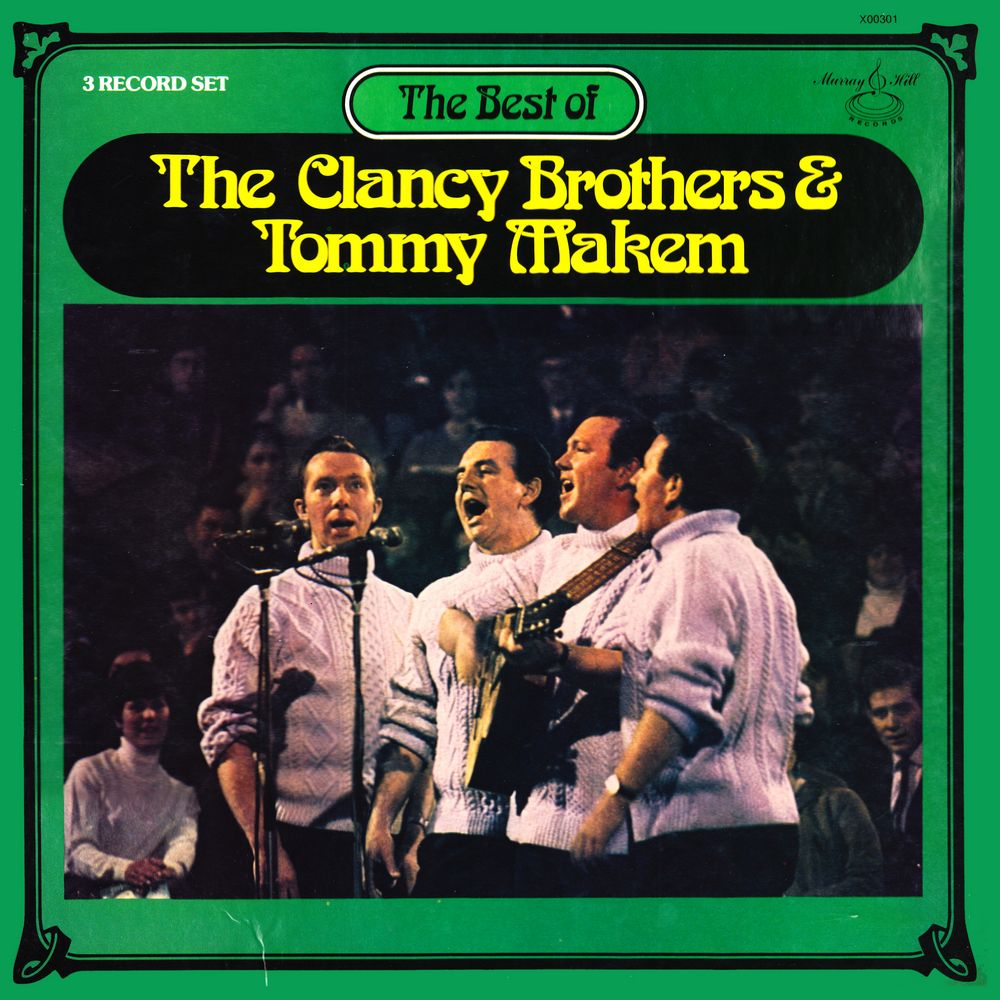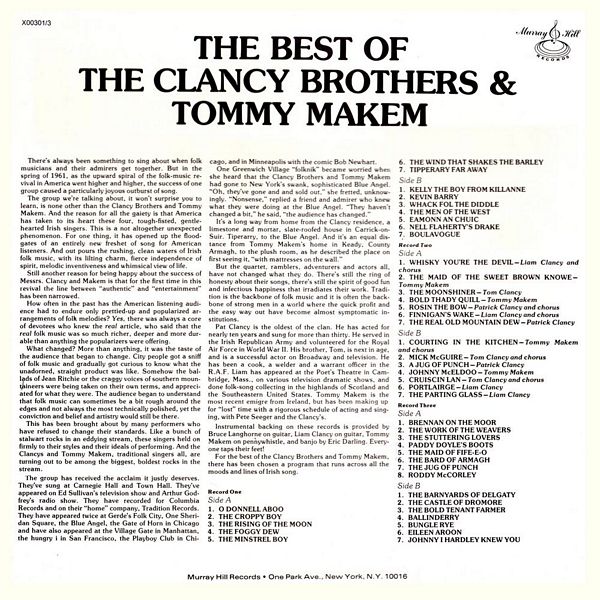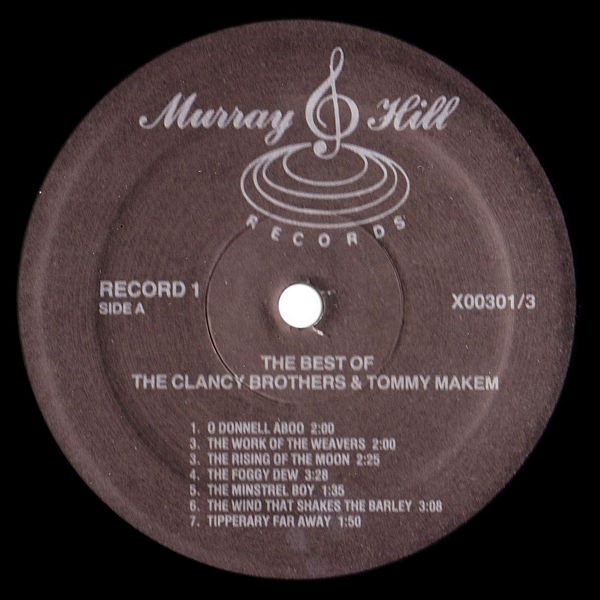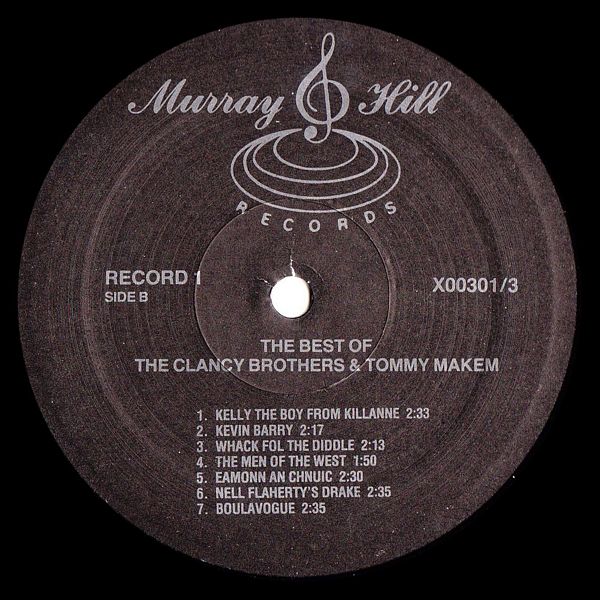

 |


 |
Sleeve Notes
There's always been something to sing about when folk musicians and their admirers get together. But in the spring of 1961, as the upward spiral of the folk-music revival in America went higher and higher, the success of one group caused a particularly joyous outburst of song.
The group we're talking about, it won't surprise you to learn, is none other than the Clancy Brothers and Tommy Makem. And the reason for all the gaiety is that America has taken to its heart these four, tough-fisted, gentle-hearted Irish singers. This a not altogether unexpected phenomenon. For one thing, it has opened up the floodgates of an entirely new freshet of song for American listeners. And out pours the rushing, clean waters of Irish folk music, with its lilting charm, fierce independence of spirit, melodic inventiveness and whimsical view of life.
Still another reason for being happy about the success of Messrs. Clancy and Makem is that for the first time in this revival the line between "authentic" and "entertainment" has been narrowed.
How often in the past has the American listening audience had to endure only prettied-up and popularized arrangements of folk melodies? Yes, there was always a core of devotees who knew the real article, who said that the real folk music was so much richer, deeper and more durable than anything the popularizers were offering.
What changed? More than anything, it was the taste of the audience that began to change. City people got a sniff of folk music and gradually got curious to know what the unadorned, straight product was like. Somehow the ballads of Jean Ritchie or the craggy voices of southern mountaineers were being taken on their own terms, and appreciated for what they were. The audience began to understand that folk music can sometimes be a bit rough around the edges and not always the most technically polished, yet the conviction and belief and artistry would still be there.
This has been brought about by many performers who have refused to change their standards. Like a bunch of stalwart rocks in an eddying stream, these singers held on firmly to their styles and their ideals of performing. And the Clancys and Tommy Makem, traditional singers all, are turning out to be among the biggest, boldest rocks in the stream.
The group has received the acclaim it justly deserves. They've sung at Carnegie Hall and Town Hall. They've appeared on Ed Sullivan's television show and Arthur Godfrey's radio show. They have recorded for Columbia Records and on their "home" company, Tradition Records. They have appeared twice at Gerde's Folk City, One Sheridan Square, the Blue Angel, the Gate of Horn in Chicago and have also appeared at the Village Gate in Manhattan, the hungry i in San Francisco, the Playboy Club in Chicago, and in Minneapolis with the comic Bob Newhart.
One Greenwich Village "folknik" became worried when she heard that the Clancy Brothers and Tommy Makem had gone to New York's swank, sophisticated Blue Angel. "Oh, they've gone and and sold out," she fretted, unknowingly. "Nonsense," replied a friend and admirer who knew what they were doing at the Blue Angel. "They haven't changed a bit," he said, "the audience has changed."
It's a long way from home from the Clancy residence, a limestone and mortar, slate-roofed house in Carrick-on-Suir. Tiperarry, to the Blue Angel. And it's an equal distance from Tommy Makem's home in Ready, County Armagh, to the plush room, as he described the place on first seeing it, "with mattresses on the wall."
But the quartet, ramblers, adventurers and actors all. have not changed what they do. There's still the ring of honesty about their songs, there's still the spirit of good fun and infectious happiness that irradiates their work. Tradition is the backbone of folk music and it is often the backbone of strong men in a world where the quick profit and the easy way ouf have become almost symptomatic institutions.
Pat Clancy is the oldest of the clan. He has acted for nearly ten years and sung for more than thirty. He served in the Irish Republican Army and volunteered for the Royal Air Force in World War II. His brother, Tom, is next in age, and is a successful actor on Broadway and television. He has been a cook, a welder and a warrant officer in the R.A.F. Liam has appeared at the Poet's Theatre in Cambridge, Mass., on various television dramatic shows, and done folk-song collecting in the highlands of Scotland and the Southeastern United States. Tommy Makem is the most recent emigre from Ireland, but has been making up for "lost" time with a rigorous schedule of acting and singing, with Pete Seeger and the Clancy's.
Instrumental backing on these records is provided by Bruce Langhorne on guitar, Liam Clancy on guitar. Tommy Makem on pennywhistle, and banjo by Eric Darling. Everyone taps their feet!
For the best of the Clancy Brothers and Tommy Makem, there has been chosen a program that runs across all the moods and lines of Irish song.